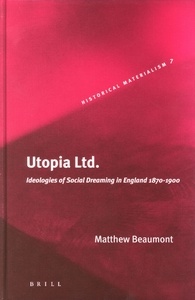Matthew Beaumont, University College London
This book uncovers the historical preconditions for the explosive revival of utopian literature at the nineteenth-century fin de siècle, and excavates its ideological content. It marks a contribution not only to the literary and cultural history of the late-Victorian period, and to the expanding field of utopian studies, but to the development of a Marxist critique of utopianism. The book is particularly concerned with three kinds of political utopia or anti-utopia, those of ‘state socialism’, feminism, and anti-communism (the characteristic expression of this last example being the cacotopia). After an extensive contextual account of the politics of utopia in late-nineteenth century England, it devotes a chapter to each of these topics before developing an original reinterpretation of William Morris’s seminal Marxist utopia, News from Nowhere.
Biographical note
Reviews
Terry Eagleton, Professor of Cultural Theory and John Rylands Fellow, University of Manchester.
‘This is a very convincing, often original, and lucidly written reading of late-nineteenth century utopian literature that makes a fine contribution to the ever-growing field of fin-de-siècle studies.‘
Sally Ledger, Professor of Nineteenth-Century Literature, Birkbeck College, University of London.
‘Utopia Ltd. presents us with a new constellation of the field under inquiry, or — as one of Beaumont’s masters of thought, Benjamin, would say — with a dialectical image which on the one hand makes some common features of late-nineteenth century utopian literature stand out, and on the other does not neglect the single stars. I recommend it warmly.‘
Darko Suvin, Emeritus Professor of English and Comparitive Literature, McGill University.
‘What I find particularly valuable about this book is the way in which it provides a new framework for understanding well-known texts such as Bellamy’s Looking Backward, and especially Morris’s News from Nowhere, by situating them in relation to the large output of utopian and “cacatopian” literature produced in the late nineteenth century. This phenomenon is an ideological episode worthy of attention in its own right, as a symptom of the widely-perceived crisis of bourgeois culture around the fin de siècle, and Beaumont does a convincing job of explaining it, thereby making it interesting to the reader. But I suspect that many on the left will be drawn to this study by the way it helps us towards a fuller understanding of Morris’s News from Nowhere and issues around Marxist utopianism.‘
Andrew Hemingway, Professor of Art History, University College, London.
Table of contents
Introduction
1. History and Utopia at the Fin de Siècle
2. State Socialism and Utopia
3. Feminism and Utopia
4. Anti-Communism and the Cacotopia
5. Utopia and the present in News from Nowhere
Conclusion
References
Index

